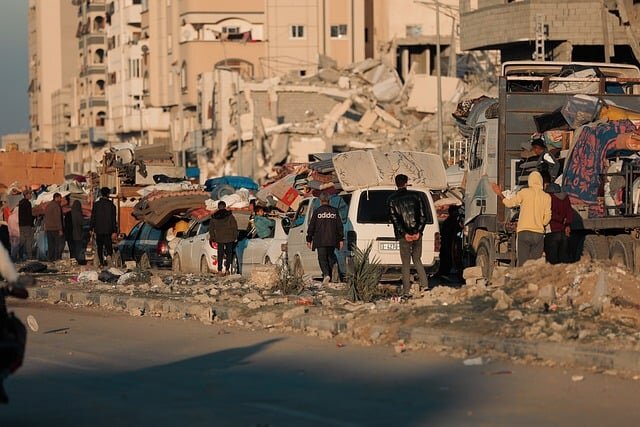‘Palestinian People Governing Palestine’ is the basic principle for post-war Gaza

SHANGHAI - The Gaza crisis, which lasted 16 months, is a major tragedy of contemporary humanity. No people want to be passively exposed again to the ravages of a war that has devastated their lives. After the ceasefire in Gaza, post-war governance in the region should proceed as quickly as possible. The forced relocation proposed by the interventionist powers violates the internationally recognized basic human rights requirements of sovereignty integrity and security of existence.
The principle of “Palestinian People governing Palestine”, which China has put forward on the question of Palestine, is the core principle of the post-war governance of Gaza. It means that Palestinian affairs should be decided by the Palestinian people themselves, and that responsible major powers should work together to oppose the forced intervention or domination of external forces in the Middle East in the post-war governance process of Gaza. The Chinese government supports the Palestinian people in leading the governance of the Gaza Strip.
I. Post-war reconstruction of Gaza must respect Palestinian sovereignty and territorial integrity
The year 2025 marks the 80th anniversary of the victory in the world anti-Fascist War, the 80th anniversary of the founding of the United Nations, and the 80th anniversary of the establishment of the Yalta system after World War II. The world order has experienced decades of evolution and has gone through trials and hardships. While the world order is likely to be at a juncture of dramatic change and rebuilding in the current revival of geopolitics dominated by increasingly overt territorial ambitions. However, no matter how the world order changes, it should not be at the expense of the well-being of the weak and the dignity of the people.
Forced relocation and military occupation by external countries and external military forces against the will of the Palestinian people are all denial of the advocacy for sovereignty and autonomy to the Palestinian people.
II. Internal reconciliation is a guarantee of the authority’s ability to govern
Regarding the internal Palestinian power struggle, China’s view has always valued, encouraged, emphasized and promoted internal unity, believing that internal reconciliation through negotiation and speaking with one voice is the embodiment of a strong and powerful national capacity.
For the current Palestinian situation, factional divisions will lead to governance failures, and “The Beijing Declaration on Ending Division and Strengthening Unity”, signed by 14 Palestinian factions in Beijing in 2024 with China’s facilitation, is precisely the creation of internal Palestinian conditions for the implementation of the two-state solution.
Using political dialogue to resolve the distribution of governance power within Palestine, enhancing the authority of the Palestinian National Authority while improving its governance capacity, and absorbing and learning from the positive experience of other countries in state governance and peacebuilding will contribute to Palestine's internal political stability and facilitate the Palestinian Authority's unified jurisdiction over all Palestinian territories.
III. Permanent ceasefire and the two-state solution as the way forward for the fundamental settlement of the question of Palestine
China’s support for a political solution to the question of Palestine is based on the two-state solution from the UN. The fulfillment of the principle of “Palestinian People Governing Palestine” is the only way to truly and effectively advance the long-term goal of the establishment of an independent Palestinian state on the basis of the 1967 borders, with East Jerusalem as its capital, and the achievement of lasting peaceful coexistence between Palestine and Israel.
China is a practitioner of friendship and cooperation among nations, a promoter of mutual understanding among civilizations and a builder of a community with a shared future for mankind. In the MENA, China is a builder of peace in the region. Against the backdrop of some countries' proposal to forcibly transfer Palestinians from Gaza to neighboring countries, insisting on “Palestinian People Governing Palestine” is all the more precious. The principle of “Palestinian People Governing Palestine” reaffirms the Palestinian people’s inalienable right to existence and self-determination. Internally, the Principle of “Palestinian People Governing Palestine” is conducive to enhancing the Palestinian national identity; externally, if all forces respect the principle of “Palestinian People Governing Palestine” on Palestinian territory, it will inevitably help reduce the risk of further complications in the Middle East situation.
With the intensifying games among the major powers in the Middle East, the principle of “Palestinian People Governing Palestine” not only safeguards the rights of the Palestinian people but also constitutes a clear rejection of unilateralism and power politics. War had brought painful memories to the people, and opposition to war should be the consensus of the government, the elite and the people in the troubled region. Major responsible powers and international organizations should negotiate a more balanced solution to the Palestinian-Israeli issue on the public platform of the international community. And any program, any arrangement for the future of Gaza, must respect the will of the Palestinian people, including the respect and recognition by all countries of the world that both Gaza and the West Bank belong to the Palestinian territory.
In upholding the principle of “Palestinian People Governing Palestine”, the international community should also work together to solve Gaza’s post-war governance problems of insufficient funding aid and humanitarian assistance that the post-war governance of Gaza will inevitably face. Otherwise, the lack of rational governance programs and adequate funding for governance will lead to ineffective governance, and even exacerbate the humanitarian crisis.
Dr. ZHANG Yuan, Professor, The Middle East Studies Institute of Shanghai International Studies University, China
Leave a Comment